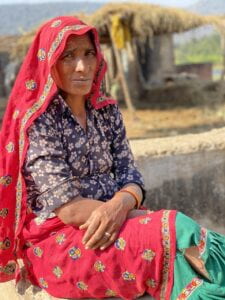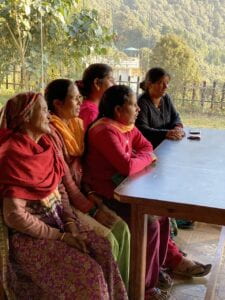Syllabus designed by Rajni Bhargava for Intermediate Hindi (YHS Fulbright-Hays 2022)
 Course Description: This course is based on the integration of learning outcomes across Interpersonal, Interpretive, and Presentational Modes of Communication. Students accomplish real-world communicative tasks in culturally appropriate ways through Standard Hindi and through colloquialisms of at least one dialect as they gain familiarity with products, practices, and perspectives of the target culture(s) and communities. Students learn grammar, vocabulary, and structures to enable them to meet functional performance goals at this level and to build a foundation for continued language learning. During this course, students can consistently perform in the Novice range while more abilities emerge and develop in the Intermediate range.
Course Description: This course is based on the integration of learning outcomes across Interpersonal, Interpretive, and Presentational Modes of Communication. Students accomplish real-world communicative tasks in culturally appropriate ways through Standard Hindi and through colloquialisms of at least one dialect as they gain familiarity with products, practices, and perspectives of the target culture(s) and communities. Students learn grammar, vocabulary, and structures to enable them to meet functional performance goals at this level and to build a foundation for continued language learning. During this course, students can consistently perform in the Novice range while more abilities emerge and develop in the Intermediate range.
Textbooks and online materials:
- Complete Hindi: Your complete Speaking, Listening, Reading and Writing (Teach Yourself) , By Rupert Snell (Author) ISBN-13: 978-1444106831, ISBN-10: 9781444106831 or
- https://drive.google.com/file/d/16PkQUb7odQEwwx74GTrURsQHUEKT1atY/view?usp=sharing.
- https://openbooks.lib.msu.edu/ll151/ (Basic Hindi 1 by Rajiv Ranjan)
WEEK 1. Topic: Vacation – A review
Language and Function:
- what students did during their vacation
- negate and affirm what students like and dislike
- why they liked and disliked
- describe one interesting episode
- use transitive and intransitive verb
- use of sentence connector, kyonki, lekin
- use of relative and correlative construction such as agar…to, jab…tab, jahaan…vahaan
- use of topic specific vocabulary for vacation
WEEK 1 and 2. Topic: Let’s go to India. Geography.
Language and Function:
- describe in some detail the geography of the Indian subcontinent on the physical and political map of India
- describe the places in detail, landmarks, different landforms around that area
- compare and contrast Indian and American cities with physical features
- use vocabulary related to geography
- use of comparisons
- use of passives
Resources: Geography (tasks and vocabulary)
- https://blogs.transparent.com/hindi/vocabulary-in-hindi-geography/
- https://wp.nyu.edu/virtualhindi/geography/
- https://openbooks.lib.msu.edu/ll151/chapter/chapter-8_grammar-degrees-of-adjective/
- https://hindilanguage.info/hindi-grammar/verbs/voice/passive-voice/
Performance Task: Intermediate Project _1
Week 3 and 4: Topic: Weather and Seasons
Language and Function:
- ask and answer questions about weather conditions
- identify and describe a variety of leisure time activities.
- express preferences about weather and activities.
- compare weather conditions in the target culture to those in the community where the students live
- vocabulary: weather-related phrases
- expressions of preference (X-ko pasand hai, pasand nahiiN hai, X-ko + infinitive + pasand hai)
Resources:
- https://wp.nyu.edu/virtualhindi/weather-and-travel-2/
- https://wp.nyu.edu/virtualhindi/weather-seasons/
- https://wp.nyu.edu/virtualhindi/weather-and-travel/
Performance Task: Weather-Related Tasks
Week 5: Time and Travel
Language and Function:
- tell time
- ask and answer questions about train time schedule
- plan the itinerary for a trip and explain why
- describe place/s of their choice
- compulsion/obligation construction — Xको + infinitive +होना (मुझे। .. जाना है, वापस आना है)
- time expressions — X +को + समय/वक्त + लगना (आप को वहां पहुंचने में १० घंटे लगेंगे )
- telling time (सवा तीन बजे, 5 बजने में 12 मिनट, 7 बजकर 10 मिनट + पर )
- infinitive + चाहना (…जाना चाहते हैं )
- use verbs, transitive and intransitive related to travel
Resources:
- https://www.delhimetrorail.com/
- https://www.hindipod101.com/blog/2020/07/31/telling-time-in-hindi/
- https://chasingthemetro.files.wordpress.com/2011/08/route_map.jpg
- https://hindilanguage.info/hindi-grammar/verbs/idiomatic-verbs/lagna/
- https://blogs.transparent.com/hindi/the-many-uses-of-lagna/
- https://open.lib.umn.edu/hindiurdu/chapter/grammar-notes-1-2-2/
- https://hindilanguage.info/hindi-grammar/verbs/idiomatic-verbs/hona/
Performance Task:
WEEK 6. Topic: Different regions of India and communities
Language and Function:
- describe different regions in India related to environment
- ask and answer questions about communities who live there
- inquire about how communities live (the family, the language)
- get information and use KWL charts
- use conjunct verbs
- use passive -voice
Resources:
- https://wp.nyu.edu/virtualhindi/warli-tribal-जcommunity/
- https://hindilanguage.info/hindi-grammar/verbs/conjunct-verbs/
- https://hindilanguage.info/hindi-grammar/verbs/voice/passive-voice/
Performance Task: Student-driven RAFT
WEEK 7. Topic: Use of natural resources for living
Language and Function:
- vocabulary related to forest and natural resources
- inquire how people live everyday
- describe in simple sentences how natural resources are used for living
- use of conjunct verbs
- use of passives
- use of compound verbs
Resources:
- एक दिन की आदिवासी ज़िंदगी | Girigram Darshani: Experience Adivasi life for a day
- गोंड औरतों की फुर्ती, शक्ति और जंगल का ज्ञान चौंका देता है | How tribal women get food from Jungle
- https://hindilanguage.info/hindi-grammar/verbs/conjunct-verbs/
- https://open.lib.umn.edu/hindiurdu/chapter/6-1-conjunct-verb/
- https://hindilanguage.info/hindi-grammar/verbs/voice/passive-voice/
- https://hindilanguage.info/hindi-grammar/verbs/compound-verbs/
Performance Task: As a journalist from your respective community, you are assigned to write an article assigned by incredible India for their website in 300 words about the geographical features and about community and the relationship between community and nature.
- Use of conjunct verbs(5 sentences), example., की ज़रूरत
- Use of passives(5 sentences), example., बोली जाती है
- Use of compound verbs(5 sentences), जाना जाता है
WEEK 8. Topic: Cultural festivals -Diwali
Language and Function:
- ask and answer questions about how Diwali is celebrated in the respective regions which students are working on.
- describe the products and practices associated with Diwali, (नए कपड़े पहनना, घर की सफाई करना, रंगोली बनाना, घर सजाना)
- explain how Diwali is celebrated using strings of connected sentence
- understand and use passive voice (घर सजाये जाते हैं, दिवाली मनाई जाती है ) Note: HLLs tend to use intransitive verbs or the impersonal 3rd person plural instead.
- use complex sentences with correlative subordinate clauses including details (जो… वह …; जब…, तब…)
Resources:
- https://indiafestivals.lrc.columbia.edu/lesson/diwali01/
- https://indiafestivals.lrc.columbia.edu/lesson/diwali02/
- https://indiafestivals.lrc.columbia.edu/lesson/diwali03/
- Warli Community: 4. वर्ली नृत्य
- https://www.youthkiawaaz.com/2019/11/why-the-tribal-culture-is-important-to-save-nature-hindi-article/
- https://www.bhaskar.com/news/latest-palsud-news-043503-2154641.html
- https://wp.nyu.edu/virtualhindi/diwali-2/india_outline_map-4/
- https://open.lib.umn.edu/hindiurdu/chapter/grammar-notes-9-2-relative-correlative-construction/
- https://hindilanguage.info/hindi-grammar/verbs/voice/passive-voice/
Performance Task: As a journalist, you are visiting a community and want to learn about how they conserve nature and use sustainable ways of living. Describe to colleagues from what festivals they celebrate, how it is celebrated, also mention if there is a story behind any of the rituals they perform and what products and practices they use.
WEEK 9. Topic: Environmental, Economic and Social problems
Language and Function:
- use environment related words
- recognize and speak about issues communities face in modern times
- ask and answer questions related to environment in these communities
- express few issues related to environment with string of sentences
- use relative and correlative construction
- use of ज़रूर (adverb), ज़रूरी (adjective), x -को x -की ज़रूरत (noun)+ होना ,
अवश्य (adverb), आवश्यक (adjective), x -को x -की आवश्यकता (noun)+ होना - use infinitives + मना है
- use subjunctive following ताकि: जाए, हटाए
- use passives in the subjunctive: सुधार किया जाए
Resources:
- https://indiantribalheritage.org/?p=37262#gsc.tab=0
- https://timesofindia.indiatimes.com/india/uttarakhand-forest-tribe-feels-let-down-by-parties/articleshow/89553693.cms
- https://www.aljazeera.com/features/2020/8/23/guests-in-our-own-homes-the-forest-tribe-of-indias-himalayas
- https://scroll.in/article/996173/in-uttarakhand-the-van-gujjar-tribe-is-being-displaced-by-environmentalism-and-development-projects
- https://open.lib.umn.edu/hindiurdu/chapter/grammar-notes-9-2-relative-correlative-construction/
- https://hindilanguage.info/hindi-grammar/conjunctions/
- https://hindilanguage.info/hindi-grammar/conditional-sentences/
Performance Task: Student-driven RAFT
Week 10. Topic: Visit to Nainital
Language and Function:
- Understand the gist of what is happening in Nainital.
- Understand the history of the place, geography, culture and stories of that place
- Learn the topic specific vocabulary on landslides
- Explain few issues and solutions as green army is doing
- Use of Passive voice
- Use of conjunct verbs
- Use of compound verbs
- Use of frequentative aspect
Resources:
- https://amritvichar.com/nainital-landslide-ochttps://open.spotify.com/track/4M42eBvwzyntEiqcq1nfp5?si=eb00d13d16ad4736curred-again-in-ballianale-people-spent-the-night-in-fear/
- https://www.jagran.com/uttarakhand/nainital-nainital-is-in-danger-all-round-landslide-become-big-threat-to-nainital-22928400.html
- video recordings, article, lectures and podcasts from Fulbright Hayes program
Performance Task: Formulate 5 questions to the NGO’s and 5 different questions to the government. Define individually what the responsibilities are for the:
- Government agencies/offices, उदाहरण: सरकार के लिए यह बहुत ज़रूरी है कि वन के जीवों को बचाने के लिए वे कुछ आवश्यक कदम उठाएँ।
- NGO activists, उदाहरण: सेवाकर्मियों के लिए यह बहुत ज़रूरी है कि वे आम लोगों से उनकी ज़रूरतों के बारे में बात करें।
Use: subjunctive: e.g. जंगल / वन बचाने के लिए क्या करें और जो सरकार नहीं कर रही है NGO कौन से कदम उठाएं
WEEK 11-12. Topic: Folk tales of the marginalized communities
Language and Functions:
- ask about and describe a series of past events
- use introductory and ending conventional phrases for story-telling
- use cohesive markers (iske baad, isii liye, uska matlab, etc.)
- Understand folk tales of the specific region in India
Resources:
- https://hindilanguage.info/hindi-grammar/verbs/basic-verb-forms/past-perfect/
- https://hindilanguage.info/hindi-grammar/conjunctions/
WEEK 13-14. Topic: Review and Movie Project: Paheli (lesson plan)
Language and Functions:
- understand the sequence of events and retell the main plot-line of the movie “Paheli”
- identify and analyze main cultural aspects: elements of local folk tales and myths, water reservoir-based practices, etc.
- use elaborate cohesion markers, such as इस वजह से, इस लिए, के बाद, के पहले, फिर, के बावजूद, क्योंकि
- become aware and/or use new vocabulary specific to Rajasthan region, geography and speech variations
- use iterative construction with perfective participle + करना: किया करती है , jजाया करती है (in this case जाया remains the same, it does not become गया) emphasizes the habitual action. जाया, किया, हुआ remains in the masculine singular form.
Resources: दुविधा
Performance Task: Read the highlighted parts of the novella. Choose three parts and compare and contrast them with the movie scenes: write down the similarities and differences between each movie scene and the related story excerpt with 250+ words for each scene in detail. Make sure you include:
- word bank: 20-25 words from each scene
- cultural notes section: 5 cultural notes from overall movie
- differences and similarities in visual and writing description
- background setting in the movie and the book